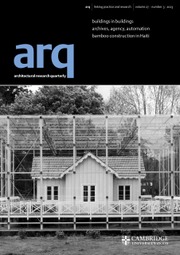Article contents
Material models, photography, and the threshold of calculation
Published online by Cambridge University Press: 08 November 2017
Extract
Histories of the advent of architectural computation typically describe a moment of transition from physical models and drawings to codes, information and data, leading almost inevitably to the digital technologies of the present. However, the trajectory from material form and its calculated representation was not always so direct. The work of Frei Otto, and the Institute for Lightweight Structures (IL) that he founded in 1964 at the University of Stuttgart, is an example of how material experimentation, media techniques, and calculation came together in novel ways. This history is distinguished by the fact that calculating machines played a minor role. In the 1960s and 1970s, researchers at the Institute for Lightweight Structures arrived at ways of making and calculating architectural form that was arguably proto-digital. But this began with entirely material processes that were not easily turned into numerical data, nor were they limited to the immaterial ‘space’ of the screen where every coordinate position – and thus every form – had to be numerically accounted for. Experiments, devices, tools, and modes of representation were developed to serve as means of translation between incalculable materiality and calculable information. Unlike early experiments with computation that happened largely within the black box of the computer, here the interaction between material objects and data took place in physical laboratories and workshop spaces.
Information
- Type
- History
- Information
- Copyright
- Copyright © Cambridge University Press 2017
- 1
- Cited by

